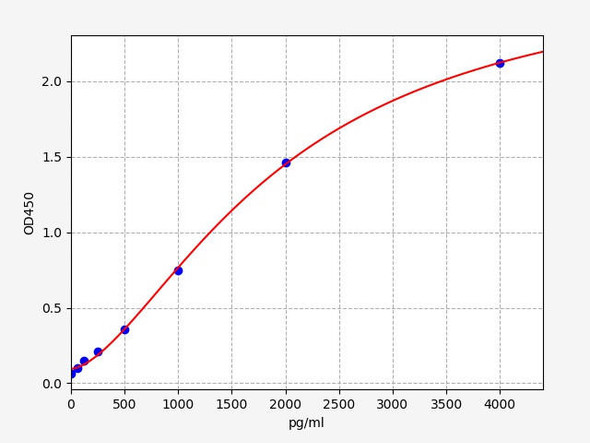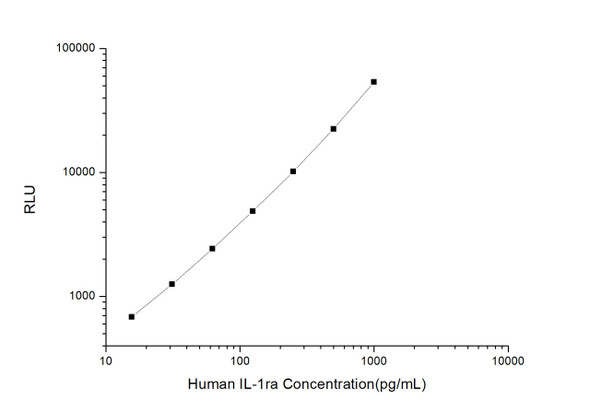Human Cell Biology ELISA Kits 5
Human IL-1ra/IL-1F3 ELISA Kit (HUES01375)
- SKU:
- HUES01375
- Product Type:
- ELISA Kit
- Size:
- 96 Assays
- Uniprot:
- P18510
- Sensitivity:
- 18.75pg/mL
- Range:
- 31.25-2000pg/mL
- ELISA Type:
- Sandwich
- Synonyms:
- IL1RN, DIRA, ICIL-1RA, IL-1RN, IL-1RA, IL-1ra3, IL1F3, IL1RA, IRAP, MVCD4
- Reactivity:
- Human
- Sample Type:
- Serum, plasma and other biological fluids
- Research Area:
- Cell Biology
Description
| Assay type: | Sandwich |
| Format: | 96T |
| Assay time: | 4.5h |
| Reactivity: | Human |
| Detection Method: | Colormetric |
| Detection Range: | 31.25-2000 pg/mL |
| Sensitivity: | 18.75 pg/mL |
| Sample Volume Required Per Well: | 100µL |
| Sample Type: | Serum, plasma and other biological fluids |
| Specificity: | This kit recognizes Human IL1ra/IL1F3 ELISA Kit in samples. No significant cross-reactivity or interference between Human IL1ra/IL1F3 ELISA Kit and analogues was observed. |
This ELISA kit uses Sandwich-ELISA as the method. The micro ELISA plate provided in this kit has been pre-coated with an antibody specific to Human IL1ra/IL1F3. Standards or samples are added to the appropriate micro ELISA plate wells and combined with the specific antibody. Then a biotinylated detection antibody specific for Human IL1ra/IL1F3 and Avidin-Horseradish Peroxidase (HRP) conjugate are added to each micro plate well successively and incubated. Free components are washed away. The substrate solution is added to each well. Only those wells that contain Human IL1ra/IL1F3, biotinylated detection antibody and Avidin-HRP conjugate will appear blue in color. The enzyme-substrate reaction is terminated by adding Stop Solution and the color turns yellow. The optical density (OD) is measured spectrophotometrically at a wavelength of 450 nm ± 2 nm. The OD value is proportional to the concentration of Human IL1ra/IL1F3. The concentration of Human IL1ra/IL1F3 in samples can be calculated by comparing the OD of the samples to the standard curve.
| UniProt Protein Function: | IL1RN: Inhibits the activity of interleukin-1 by binding to receptor IL1R1 and preventing its association with the coreceptor IL1RAP for signaling. Has no interleukin-1 like activity. Binds functional interleukin-1 receptor IL1R1 with greater affinity than decoy receptor IL1R2; however, the physiological relevance of the latter association is unsure. The intracellular form of IL1RN is predominantly expressed in epithelial cells. 4 isoforms of the human protein are produced by alternative splicing. |
| UniProt Protein Details: | Protein type:Secreted, signal peptide; Vesicle; Cytokine; Secreted Chromosomal Location of Human Ortholog: 2q14. 2 Cellular Component: extracellular space; cytoplasm; plasma membrane; intracellular Molecular Function:interleukin-1 Type I receptor antagonist activity; interleukin-1 receptor binding; interleukin-1 Type II receptor antagonist activity; interleukin-1, Type II receptor binding; cytokine activity; interleukin-1, Type I receptor binding; interleukin-1 receptor antagonist activity Biological Process: response to drug; positive regulation of JNK activity; negative regulation of glutamate secretion; negative regulation of heterotypic cell-cell adhesion; response to glucocorticoid stimulus; carboxylic acid metabolic process; response to lipopolysaccharide; female pregnancy; sensory perception of pain; fever; chronic inflammatory response to antigenic stimulus; memory; response to starvation; insulin secretion; acute-phase response; immune response; negative regulation of cytokine and chemokine mediated signaling pathway; response to activity; lipid metabolic process; negative regulation of membrane potential; negative regulation of cell migration; negative regulation of apoptosis Disease: Microvascular Complications Of Diabetes, Susceptibility To, 4; Gastric Cancer, Hereditary Diffuse; Osteomyelitis, Sterile Multifocal, With Periostitis And Pustulosis |
| NCBI Summary: | The protein encoded by this gene is a member of the interleukin 1 cytokine family. This protein inhibits the activities of interleukin 1, alpha (IL1A) and interleukin 1, beta (IL1B), and modulates a variety of interleukin 1 related immune and inflammatory responses. This gene and five other closely related cytokine genes form a gene cluster spanning approximately 400 kb on chromosome 2. A polymorphism of this gene is reported to be associated with increased risk of osteoporotic fractures and gastric cancer. Four alternatively spliced transcript variants encoding distinct isoforms have been reported. [provided by RefSeq, Jul 2008] |
| UniProt Code: | P18510 |
| NCBI GenInfo Identifier: | 124312 |
| NCBI Gene ID: | 3557 |
| NCBI Accession: | P18510. 1 |
| UniProt Secondary Accession: | P18510,Q14628, Q53SC2, Q7RTZ4, Q96GD6, Q9UPC0, A8K4G1 |
| UniProt Related Accession: | P18510 |
| Molecular Weight: | 16,142 Da |
| NCBI Full Name: | Interleukin-1 receptor antagonist protein |
| NCBI Synonym Full Names: | interleukin 1 receptor antagonist |
| NCBI Official Symbol: | IL1RN |
| NCBI Official Synonym Symbols: | DIRA; IRAP; IL1F3; IL1RA; MVCD4; IL-1RN; IL-1ra; IL-1ra3; ICIL-1RA |
| NCBI Protein Information: | interleukin-1 receptor antagonist protein; IL1 inhibitor; IL1RN (IL1F3); type II interleukin-1 receptor antagonist; intracellular IL-1 receptor antagonist type II; intracellular interleukin-1 receptor antagonist (icIL-1ra) |
| UniProt Protein Name: | Interleukin-1 receptor antagonist protein |
| UniProt Synonym Protein Names: | ICIL-1RA; IL1 inhibitor; INN: Anakinra |
| Protein Family: | Interleukin-1 receptor antagonist protein |
| UniProt Gene Name: | IL1RN |
| UniProt Entry Name: | IL1RA_HUMAN |
As the OD values of the standard curve may vary according to the conditions of the actual assay performance (e. g. operator, pipetting technique, washing technique or temperature effects), the operator should establish a standard curve for each test. Typical standard curve and data is provided below for reference only.
| Concentration (pg/mL) | O.D | Average | Corrected |
| 2000 | 2.434 2.488 | 2.461 | 2.379 |
| 1000 | 1.635 1.663 | 1.649 | 1.567 |
| 500 | 1.009 0.981 | 0.995 | 0.913 |
| 250 | 0.467 0.503 | 0.485 | 0.403 |
| 125 | 0.296 0.292 | 0.294 | 0.212 |
| 62.5 | 0.196 0.172 | 0.184 | 0.102 |
| 31.25 | 0.128 0.14 | 0.134 | 0.052 |
| 0 | 0.076 0.088 | 0.082 | -- |
Precision
Intra-assay Precision (Precision within an assay): 3 samples with low, mid range and high level Human IL1ra/IL1F3 ELISA Kit were tested 20 times on one plate, respectively.
Inter-assay Precision (Precision between assays): 3 samples with low, mid range and high level Human IL1ra/IL1F3 ELISA Kit were tested on 3 different plates, 20 replicates in each plate.
| Intra-assay Precision | Inter-assay Precision | |||||
| Sample | 1 | 2 | 3 | 1 | 2 | 3 |
| n | 20 | 20 | 20 | 20 | 20 | 20 |
| Mean (pg/mL) | 96.60 | 253.23 | 775.71 | 104.45 | 248.93 | 801.14 |
| Standard deviation | 5.12 | 13.12 | 41.11 | 5.89 | 12.92 | 43.58 |
| C V (%) | 5.30 | 5.18 | 5.30 | 5.64 | 5.19 | 5.44 |
Recovery
The recovery of Human IL1ra/IL1F3 ELISA Kit spiked at three different levels in samples throughout the range of the assay was evaluated in various matrices.
| Sample Type | Range (%) | Average Recovery (%) |
| Serum (n=5) | 95-110 | 101 |
| EDTA plasma (n=5) | 92-108 | 99 |
| Cell culture media (n=5) | 88-101 | 95 |
Linearity
Samples were spiked with high concentrations of Human IL1ra/IL1F3 ELISA Kit and diluted with Reference Standard & Sample Diluent to produce samples with values within the range of the assay.
| Serum (n=5) | EDTA plasma (n=5) | Cell culture media (n=5) | ||
| 1:2 | Range (%) | 98-113 | 84-99 | 90-104 |
| Average (%) | 104 | 91 | 98 | |
| 1:4 | Range (%) | 91-102 | 80-89 | 83-96 |
| Average (%) | 97 | 85 | 88 | |
| 1:8 | Range (%) | 91-102 | 83-95 | 83-96 |
| Average (%) | 96 | 88 | 87 | |
| 1:16 | Range (%) | 90-104 | 83-94 | 87-102 |
| Average (%) | 95 | 88 | 93 |
An unopened kit can be stored at 4°C for 1 month. If the kit is not used within 1 month, store the items separately according to the following conditions once the kit is received.
| Item | Specifications | Storage |
| Micro ELISA Plate(Dismountable) | 8 wells ×12 strips | -20°C, 6 months |
| Reference Standard | 2 vials | |
| Concentrated Biotinylated Detection Ab (100×) | 1 vial, 120 µL | |
| Concentrated HRP Conjugate (100×) | 1 vial, 120 µL | -20°C(shading light), 6 months |
| Reference Standard & Sample Diluent | 1 vial, 20 mL | 4°C, 6 months |
| Biotinylated Detection Ab Diluent | 1 vial, 14 mL | |
| HRP Conjugate Diluent | 1 vial, 14 mL | |
| Concentrated Wash Buffer (25×) | 1 vial, 30 mL | |
| Substrate Reagent | 1 vial, 10 mL | 4°C(shading light) |
| Stop Solution | 1 vial, 10 mL | 4°C |
| Plate Sealer | 5 pieces | |
| Product Description | 1 copy | |
| Certificate of Analysis | 1 copy |
- Set standard, test sample and control (zero) wells on the pre-coated plate and record theirpositions. It is recommended to measure each standard and sample in duplicate. Note: addall solutions to the bottom of the plate wells while avoiding contact with the well walls. Ensuresolutions do not foam when adding to the wells.
- Aliquot 100 µL of standard solutions into the standard wells.
- Add 100 µL of Sample / Standard dilution buffer into the control (zero) well.
- Add 100 µL of properly diluted sample (serum, plasma, tissue homogenates and otherbiological fluids) into test sample wells.
- Cover the plate with the sealer provided in the kit and incubate for 90 min at 37 °C.
- Aspirate the liquid from each well, do not wash. Immediately add 100 µL of BiotinylatedDetection Ab working solution to each well. Cover the plate with a plate seal and gently mix. Incubate for 1 hour at 37 °C.
- Aspirate or decant the solution from the plate and add 350 µL of wash buffer to each welland incubate for 1-2 minutes at room temperature. Aspirate the solution from each well andclap the plate on absorbent filter paper to dry. Repeat this process 3 times. Note: a microplatewasher can be used in this step and other wash steps.
- Add 100 µL of HRP Conjugate working solution to each well. Cover with a plate seal andincubate for 30 min at 37 °C.
- Aspirate or decant the solution from each well. Repeat the wash process for five times asconducted in step 7.
- Add 90 µL of Substrate Reagent to each well. Cover with a new plate seal and incubate forapproximately 15 min at 37 °C. Protect the plate from light. Note: the reaction time can beshortened or extended according to the actual color change, but not by more than 30min.
- Add 50 µL of Stop Solution to each well. Note: Adding the stop solution should be done inthe same order as the substrate solution.
- Determine the optical density (OD value) of each well immediately with a microplate readerset at 450 nm.






